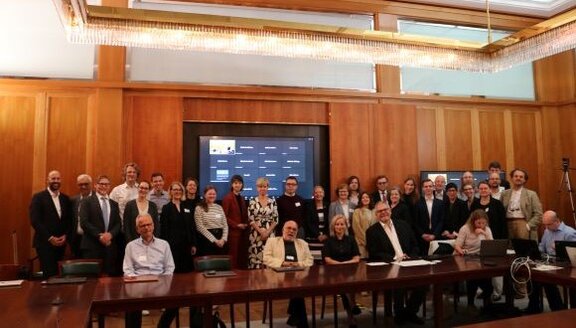On 13 September, the 14th National Internet Governance Forum Germany (IGF-D) took place at the Federal Foreign Affairs Office in Berlin. The youth IGF-D already met the evening before at the Wikimedia premises. Internet governance - like the Internet itself - affects the entire world and is therefore a task that must be dealt with at a global level. The fact that, in addition to the annual Internet Governance Forum of the United Nations, there are also forums on national and regional levels is entirely justified. There is a need for professional exchange between the actors in the respective region in order to develop a common multistakeholder perspective and to bring this to the global IGF.
The event kicked off on 13 September with a panel discussion on how the European Artificial Intelligence Act (AI Act) can create a quality standard for artificial intelligence (AI) as a catalyst for digital innovation. The Act aims to set high standards for AI-based systems with potentially serious risks for society and individuals. There is currently a struggle in the ongoing parliamentary process, particularly over the question of who should be responsible for deciding the level of risk potential and the associated obligation to comply with the standards. Moderated by Julia Kloiber (Managing Director, Superrr Lab), the panelists Markus Beckedahl (founder of netzpolitik. org; Co-Founder re:publica), Rosanna Fanni (Trade and Technology Coordinator, Centre for European Policy Studies), Linda Schwarz (Policy and Science Officer, Gesellschaft für Informatik), Matthias Spielkamp (Co-Founder and Managing Director, AlgorithmWatch) and Alexandra Wudel (Co-Founder and Managing Director, FemAI) focused the debate on the risk of fundamental rights being violated by unregulated AI applications. The potential threat affects all people regardless of their status or national affiliation, but marginalized, disadvantaged or vulnerable groups - such as children - must receive special attention. In order to enable victims who have been discriminated against or had their right to privacy violated to seek redress, Spielkamp said that complaint mechanisms are indispensable. According to the panelists and participants, the AI Act should take a holistic human rights-based approach to the standardization of AI-based systems.
Friederike von Franqué (EU & International Regulatory Advisor, Wikimedia Germany) then discussed the UN Secretary General’s Global Digital Compact and its influence on the Internet Governance Forum with Tobias Bacherle (MdB).
In the second part of the day, the Youth IGF took over the moderation. By linking sustainability and digitalization, the German Youth IGF - a group of young professionals who prepared this year’s IGF-D - chose a topic that also requires global consideration. After an introductory lightning talk by Katrin Ohlmer (Managing Director, DOTZON GmbH, Chair of the Board, ISOC.de e. V.), work was carried out in the light of the previous evening event under the heading "Digital Sustainability: An Opportunity for the Future?" on the connection as well as the interactions between digitalisation and sustainability in the areas of "ecology", "economy" and "social affairs".
At the end, Wolfgang Kleinwächter discussed what role protection against attacks from cyberspace play in the new national security strategy of June 2023 with the German government’s cyber ambassador Regine Grienberger. According to Grienberger, a rather static field of work until then has become a highly dynamic one as a result of the Russian war of aggression in the Ukraine, in which peace initiatives for cyberspace are being discussed at various levels. However, he said, there is neither a majority for a treaty that is binding under international law, nor is it clear what would have to be regulated in it. With reference to existing norms of international humanitarian law and human rights law, a regulatory gap could hardly be identified. Germany is actively involved in the negotiations of various UN bodies for the development of capacity- and confidence-building measures for cybersecurity and responsible behavior by states in cyberspace. In addition, Germany is participating in the so-called "Ad-Hoc Committee" (AHC), in which 193 UN states are discussing a new UN convention to combat cybercrime. According to Grienberger, however, there are significant differences in what individual countries understand by cybercrime. Cybercrime specifically exploits this arbitrariness of jurisdictions, which is precisely why combating it only makes sense and is only possible across borders.
Grienberger made a plea for the IGF’s multistakeholder approach and thus a well-rounded conclusion to the event with her statement, "The stability of cyberspace is not only ensured by states, it also needs non-state actors."

